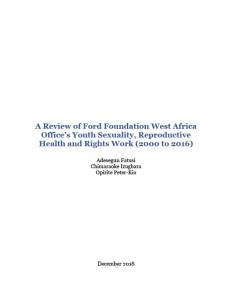Evaluating Ford’s youth sexuality, reproductive health, and rights work in West Africa
The challenge
West Africa’s population is predominantly young, with a median age of 17.9 years. This region, along with the others in sub-Saharan Africa, constitutes an area of the world where the population of young people will continue to grow significantly beyond 2050. While countries in the region have different social, political, economic and demographic profiles, they are generally characterized by large numbers of young people who live in poverty, are out of school, and have limited access to quality social and health services.
Young people need sexual and reproductive health education and services in order to thrive into adulthood. Yet these services remain scarce in the region. As a result, young people across West Africa are at heightened risks for early marriage, early and unwanted pregnancy, unsafe abortion and maternal mortality, and HIV and other sexually transmitted infections. The region has the highest global proportion of girls who have given birth before age 19. West African countries also have some of the highest rates of child marriage in the world. According to UNICEF, in Nigeria alone, 23 million women and girls were married as children.1 Adolescent girls are also at higher risk of childbirth- and pregnancy-related complications, including maternal mortality.
In the late 1990s and early 2000s, governments across the region recognized the need to improve sexual and reproductive health outcomes in order to achieve sustainable development. Yet, Ford saw that efforts by national governments and non-governmental organizations (NGOs) to provide youth with needed services and education were limited, uncoordinated and poorly resourced. There were few established NGOs working on youth sexual and reproductive health and rights (YSRHR) in the region, and the policy environment was not particularly supportive of such an agenda.
What we did
Between 2000 and 2016, the Ford Foundation invested about $56 million and supported 92 organizations to advance the sexual and reproductive health and rights of young people in West Africa. More than 80 percent of the grants went to organizations based in Nigeria because of its large population and needs related to YSRHR, and based on a strategic decision not to spread funds thinly across many countries.
Ford’s programming focused on four strategic outcomes: improving young people’s access to sexual and reproductive health and rights information, for example, through sexuality education curricula; (ii) improving access to adolescent and youth-friendly health services; (iii) increasing young people’s access to capacity and skills development opportunities; (iv) fostering a policy environment supportive of YSRHR. Ford complemented these programmatic goals with funding for research to inform policy and program development, including the establishment of the African Regional Sexuality Research Centre, and placed a heavy emphasis on institutional capacity strengthening.
This 2018 evaluation sought to document Ford’s contributions to moving the needle on YSRHR-related issues in West Africa, particularly in Nigeria, and to identify lessons and key principles that can inform future work.
What we learned
- Investing in research and building evidence is essential for developing effective programming and helping to shape policy decisions. Ford’s funding to both independent researchers and research institutions generated evidence on key issues, including child marriage; FGM and girl child education; adolescent reproductive health; HIV care, management and budgeting in Nigeria; and gender-based violence in West Africa. In addition to informing the policy and programming efforts of grantees, this research contributed to the field’s knowledge base and the efforts of allied stakeholders.
- Robust and strength-based partnerships and coalition building are important for optimal impact. Support for cross- and intra-sectoral partnerships and coalition-building amplified the strengths and capacities of various partners. For example, partnerships between Nollywood artists, researchers and practitioners ensured the wide dissemination of evidence in accessible forms, spurring community discussions, changes in harmful norms and practices, and policy actions.
- Building strong and active partnerships with governments is imperative for long-term sustainability and sustained policy success. While NGOs are able to initiate innovative and socially responsive agendas, policy victory cannot be sustained without active government partnership and buy-in. Ford’s direct and indirect support to local governments helped ensure the delivery of YSRHR programs in states across Nigeria and promoted government ownership for their implementation. Continued attention to deepening relationships and building synergies with governments and their agencies will promote adoption and scale up of promising programs.
